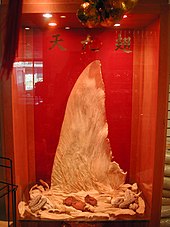Shark finning
Shark finning (including shark finning or short Finning ) refers to the separation of the fin (dorsal fin) and other fin of the shark (English shark ) and the subsequent disposal of the animal in the sea. The shark is usually not killed for this, but it is unable to swim afterwards and sinks to the bottom, where it dies from suffocation or is eaten by other carnivores .
background
To catch the sharks, longline is usually used . Long-line fishing is now the main cause of the decline in shark populations worldwide. Since shark finning is carried out at sea, the fishermen only have to transport the fins ashore and throw the "remaining" shark, whose meat is considered to be of insufficient value. to transport it back to the sea. The fin is then dried on land and sold. In shark finning there are no restrictions on size, age or type of shark; every fish that is caught for this is “finned” and then dies.
The shark finning has increased in recent years and decades, by increasing the demand strong, especially through the growing demand in China for the production of shark fin soup . Due to the growing prosperity there, a boom was triggered, as the soup is served as a prestige object due to the high price of sometimes over 600 US dollars per kilogram of dried fin. But the dried fin is also used for traditional medicine.
The shark finning is distributed worldwide and is not monitored. Estimates of the number of sharks killed for their fins alone were between 26 and 73 million sharks between 1996 and 2000, which would give an arithmetical mean of 38 million annually. The total number of sharks killed is estimated at up to 100 million per year. Around 8,000 tons of shark fins are processed every year, with the fins only making up around 4 percent of a shark's body weight. This means that around 200,000 tons of sharks are thrown back into the sea.
According to experts, the global shark population will collapse within the next decade due to longline fishing for sharks. Due to the heavy overfishing , the stocks no longer have a chance to regenerate. A key problem for sharks is their slow rate of reproduction . Many species take 25 to 30 years to reach sexual maturity. After that, some of them only have offspring every two years.
The impact on the respective ecosystems cannot currently be foreseen. In particular, those parts of the population who use the shark for food are hindered in their often traditional foraging. In developing countries in particular, this will further exacerbate the food shortage. With shark finning , up to 98 percent of the shark is destroyed unused.
Animal rights activists point out how agonizing after Finning death is. Sharks have to keep moving in order to wash their gills with water. If they cannot, they suffocate painfully and very slowly (sometimes over several days).
As a key species , sharks have an enormous impact on almost all species in the ocean. Removing such a key species from the system damages the entire food chain . The biodiversity is falling dramatically, which also has an impact on people's fishing.
International admission
The shark finning is by much of the population outside of East Asia declined and conservationists worldwide. Especially the shark finning and fishing with longline is made globally responsible for the dramatic decline in populations.
To protect the sharks from finning , some new laws have been enacted, but these are practically not monitored in international waters. International fisheries authorities are currently trying to ban the fishing of sharks in the Atlantic and Mediterranean . The shark finning is in the eastern Pacific already banned. While attempts are being made to monitor this fishing ban, sharks are still being caught and “finned” in the Indian Ocean and the rest of the Pacific. In Thailand and Singapore , the consumption of shark fins has been reduced by 25 percent thanks to large awareness-raising campaigns. At the international conference of the Washington Convention on Species Conservation (CITES) in 2010, the protection of fish and sharks failed due to resistance from Asian countries, particularly Japan.
Ecuador
In September 2004, the Ecuadorian government issued a total shark fishing ban and an export ban on shark fins. This prohibition is circumvented, often with the approval of the Ecuadorian Navy. After visiting the Galápagos Islands in September 2004, then President Lucio Gutiérrez lifted the ban on the export of fins when the shark was caught as bycatch . In fact, this meant an end to the protection of the sharks.
Malaysia

On September 15, 2007, shark fin soup was removed from menus on official occasions. This action was seen as a concession by the Malaysian Environment Minister Azmi Khalid to the local environmental organization Malaysian Nature Society for the conservation of shark species .
Maldives
Since 1997, fishing and “finning” of sharks (at least within the tourist atolls) has been officially banned in the Maldives, but is not prosecuted by the government or the authorities. Since the shark protection organization Sharkproject regularly received evidence of killed sharks from the region, but never a case was known in which an offense was punished by local fishermen, the organization awarded the government of the Maldives the negative Shark Enemy Award 2004 due to "lying government policy".
New Zealand
The great white shark was placed under protection in New Zealand's territorial waters. Catching by New Zealand fishing boats is also prohibited. Shark finning is permitted on other species of shark if they are already dead.

United States
Shark fishing has been banned for ships in US waters since 2002 . However, this fishing ban only applies to ships flying the US flag. Other ships therefore continue to catch sharks unhindered.
European Union
The EU banned shark fins from being severed on board ships in 2003. However, the ordinance still allowed exceptions in the form of special fishing permits. These applied to ships that stated that they would recycle all shark parts and keep the carcasses on board instead of throwing the mutilated bodies of the sharks back into the sea. However, the fins and bodies could be brought into different ports, which made control in practice impossible. The loopholes were mainly used by Spain and Portugal to continue finning. On November 22nd, 2012, the EU Parliament (against the votes of Spain and Portugal) passed a stricter new regulation, according to which sharks can only be brought onto land with intact fins. The new regulation came into force on July 6, 2013, seven days after its publication in the European Official Journal , and applies to all EU waters and ships flying the EU flag.
Web links
- Seashepherd - The Brutal Business of Shark Finning. Archived from the original on December 21, 2010 ; accessed on January 1, 2015 .
- Website of the initiative Stop Shark Finning (Engl.)
Individual evidence
- ↑ What is a longline? ( Memento from December 21, 2010 in the Internet Archive ), Sea Shepherd Germany
- ↑ 38 Million Sharks Killed for Fins Annually, Experts Estimate , National Geographic News, October 12, 2006
- ↑ Archived copy ( memento of the original from April 1, 2016 in the Internet Archive ) Info: The archive link was inserted automatically and has not yet been checked. Please check the original and archive link according to the instructions and then remove this notice. (English), WildAid
- ^ The Brutal Business of Shark Finning ( Memento December 21, 2010 in the Internet Archive ), Sea Shepherd Germany
- ^ A b Shark in need: Species conservationists advise on catch restrictions , Deutschlandfunk, January 29, 2010
- ↑ Shark Finning Banned in Eastern Pacific Ocean , Environment News Service, June 29, 2005
- ↑ a b c WildAid Programs: Sharks (English), WildAid
- ↑ Sharks and Tuna: Species Conservation Conference fails in the protection of fish , Spiegel Online from March 25, 2010
- ↑ Species protection conference ends: Failed, playful, lost , n-tv from March 25, 2010
- ↑ Malaysian ministry bans shark's fin soup , Channel NewsAsia, September 15, 2007
- ^ Maldives: Bloody shark butchery in the island paradise , Spiegel Online from September 14, 2008
- ↑ Full protection for great white sharks starts today , New Zealand Government from April 1, 2007
- ↑ Regulation (EU) No. 605/2013 of the European Parliament and of the Council of June 12, 2013 amending Regulation (EC) No. 1185/2003 of the Council on the severing of shark fins on board ships
- ↑ MEPs for the ban on finning, the cutting off of the dorsal fins of live sharks , European Parliament of November 22, 2012
- ↑ Finning: EU stops cruel mutilation of sharks , Spiegel Online, November 22, 2012



